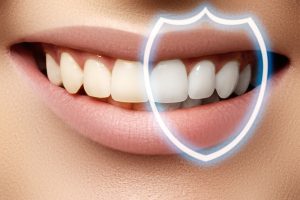A cosmetic dentistry procedure, dental bonding adheres tooth-colored resin to restore a tooth’s shape and appearance. This is done by first applying the material to the tooth then hardening it with a special light. This creates a chemical bond and permanently restores the tooth. There are numerous conditions where the bonding process provides an effective solution to a cosmetic dental issue.
When is Dental Bonding the Best Solution?
- To repair chipped, cracked or broken teeth
- To close spaces between teeth
- To lengthen short teeth
- To correct the tone of a tooth that has become discolored
- Can be used as an alternative to amalgam fillings
This procedure can be carried out in any dental office in one visit and does not require anesthesia (unless used to fill cavities). It is quick as well and takes no more than an hour per tooth to complete.
How to Maintain Teeth That Have Been Bonded
One of the chief advantages to undergoing a dental bonding procedure rather than a crown, for example, is that bonding is easy and far less expensive. However, unlike veneers and crowns, the resin used is not as hard nor as stain resistant. Care must be taken to ensure that the bonding itself does not chip or break off the tooth.
Bonded teeth do not require special cleaning procedures. Just brush twice a day and continue to follow your daily flossing and mouthwash regimen. Since bonded teeth can chip, reexamine your daily habits and avoid those that could damage your tooth repair. These include biting fingernails, chewing on ice cubes, or pencils and pens. As soon as you become aware of any damage to a repaired tooth, be sure to see your dentist immediately.
Our teeth are made to last a lifetime, yet sometimes they sustain damage and require repair. Similarly, the resins used in dental bonding will last for years, but will likely need to be replaced over time. The average is about 7 years until the repair needs a touchup or replacement, however this depends on the individual’s dental habits and the extent of the original repair.
The cost to have a tooth bonded can vary widely. Most dental insurance, however, does not cover cosmetic dental procedures. If you do not have dental insurance, an EDP Dental Plan is a great alternative. While it is not dental insurance, an EDP discount plan enables singles, couples and families to receive substantial savings on dental procedures – as much as 60%.
There are many additional benefits our members appreciate as well. To learn more about our affordable dental plans, please contact us at (800) 777-1085.







